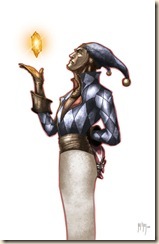The most important thing a writer does is write. And really, to do that, all you need to have is a writing implement (pen, pencil, crayon…) and some paper.
The next most important thing a writer does is try to get published, and to best enable that, one’s tools need to be a bit more complex. This article is geared toward the new writer who is seeking adequate tools for both writing convenience and publishing.
Hardware
Laptop
In my opinion, a laptop is essential for writing. I’m a pretty mobile guy; most of my writing is done when I’m not at home. A laptop meets my needs: with a laptop, I can write on my lunchbreak at work; I can write while riding in the carpool, or at my kids’ soccer practice. The portability of a laptop, for me, is 90% of its value. I favor lightweight machines with good batteries and non-reflective screens over machines with powerful computing abilities and good graphics. My laptop is for writing, not for playing video games: that means that I don’t have to have the latest model.
What I need in a laptop (from a hardware standpoint):
- Ethernet card (or USB hub with ethernet adapter). Most places that provide internet access have gone wireless, but I’m reluctant to give up the wire.
- Wireless Card. For connecting to wireless access points at the coffee shop, library, etc.
- At least two USB slots. One for my iPod, one for any other USB peripherals (like a printer). In addition, if your laptop doesn’t have an ethernet card, you can buy a USB ethernet adaptor to get wired.
- Non-reflective (or low reflective) screen. For outdoor writing.
- Good battery (7+ hours of life)
Most of my research material is done on my laptop, and most of my research is done on the internet—that makes the first two bullet points essential. I suppose I probably don’t need as hefty a battery as I have, but I like to be prepared for those long family roadtrips/campouts where there’s no outlet to recharge with.
I personally prefer PCs to Macs. It’s all about the price, I’m afraid: no getting around it, Macs are too expensive. I buy refurbished laptops to cut the cost even more. My current machine is a Dell Inspiron 15, and it cost me around $400. The screen is 15 inches wide, and is a little more reflective than I like, but it’s still within the range of acceptable. It’s fairly lightweight, and the battery I bought ($80) lasts around 7 hours if I turn the monitor brightness to low.
Printer
You need a printer if you’re going to be trying to get published. Alas, enough places still require hard-copy manuscripts that owning one is an unavoidable expense for the writer. (I suppose that you COULD go to the library instead, if your library has a printer they allow individuals to print from…)
Thankfully, printers are cheap and most of them are hardy. You’ll wind up spending more on ink than anything else. An adequate printer will run about $80; ink cartridges run about $20/cartridge.
Software
Word Processing Program
What’ll it be? Microsoft Word? WordPerfect? OpenOffice?
Most folks just use Microsoft Word. I do too, but that’s because I use Word at work, so it’s the program I’m most familiar with. It’s definitely not the most user friendly, and its quirks—especially with pagination and bulleting and numbering—can be downright mind-numbing. Our publisher swears—literally—by WordPerfect, and he’s a best-selling writer, or something.
I think that it comes down to what you’re familiar with, and what you’re willing to pay. On that note, let me plug OpenOffice—a full suite of office applications (word proccessing, spreadsheet, slideshow, paint, database) that is available for free, and is developed under an Open License from Sun Systems. In my opinion, the interface is not quite as slick as what you’ll find in Word or WordPerfect, but check the price: free compared to…well compared to whatever MS Office is selling for these days. In addition, since the suite is maintained by an open community, you can just update your software occasionally rather than having to buy a new version when the software publisher decides he needs a new swimming pool.  OpenOffice is available for Windows, Linux, and Mac operating systems, too.
OpenOffice is available for Windows, Linux, and Mac operating systems, too.
Development Software
By ‘development software’ I mean a piece of software that will allow you to quickly and easily build a story bible. A story bible is a document, or series of documents where you keep all the details about your work in progress—plot, characters, names for characters, magic system, sciencey explanations…everything. Word processors are just mediocre at this—generally, you want to have some sort of interface that allows you to navigate, index, and search in a more robust way than is possible with word processors.
Scrivener is a program that I hear a LOT about from my Mac-using friends. It was raved about so much, a couple friends bought Macs on the cheap just to install it and give it a shot. And now they’re confirmed, dyed-in-the-wool, true-blue-through-and-through converts to the program. The good news (for me) is that Scrivener is trying to get a Windows port up and running; I’m eager to try it out. The Mac version of Scrivener retails for $45; the Windows version may cost the same. It’s scheduled to be released in June 2011. One negative to Scrivener—there’s a learning curve to using it effectively. But I hear that once you’ve learned it, it’s a real boon.
Wikipedia-style software is also popular. I use WikiPad for my story bible, and it’s adequate. There’s very little to learn, and the interface is intuitive and natural.
Tracking Software
Tracking software allows you to track numbers on your work. Some folks just use a spreadsheet program like MS Excel; others go in for designing a full database. Tracking software is useful in a couple ways: if you’re actively submitting, tracking software helps you note when you submitted and where. That way, you don’t submit stories to the same market (or agent, or whatever) twice.
I track all my submissions through a Microsoft Access database application I created; that may be a little bit above and beyond what most folks are interested in doing. The important thing for me is to be able to see, or find quickly, which markets have seen what work.
I also track my daily word count—that’s fairly simple with a spreadsheet and a couple formulas.
I hope you’ve enjoyed this look into my toolbox. Please put everything back where you found it.
--Scott M. Roberts
Assistant Editor, IGMS





